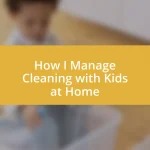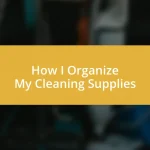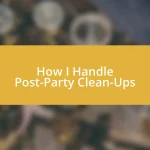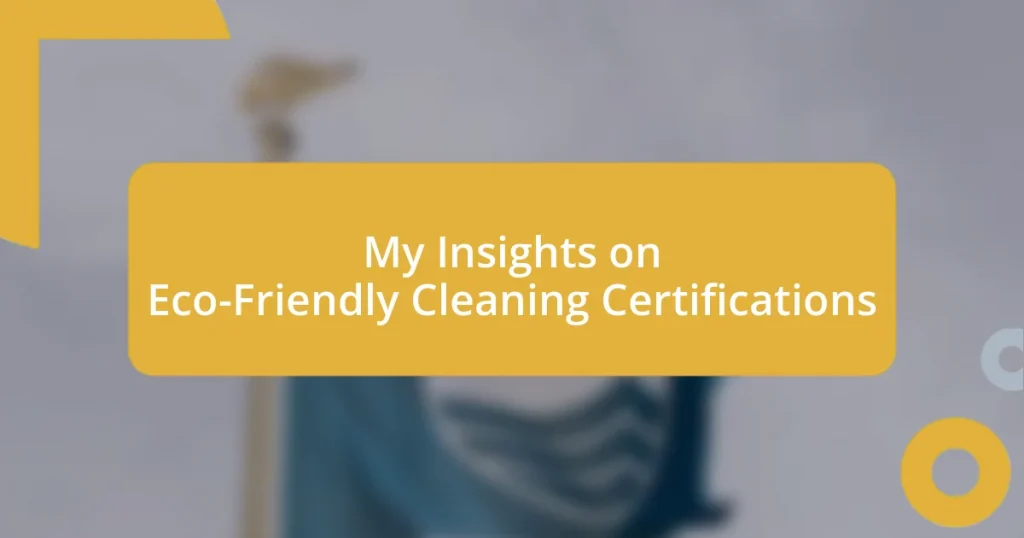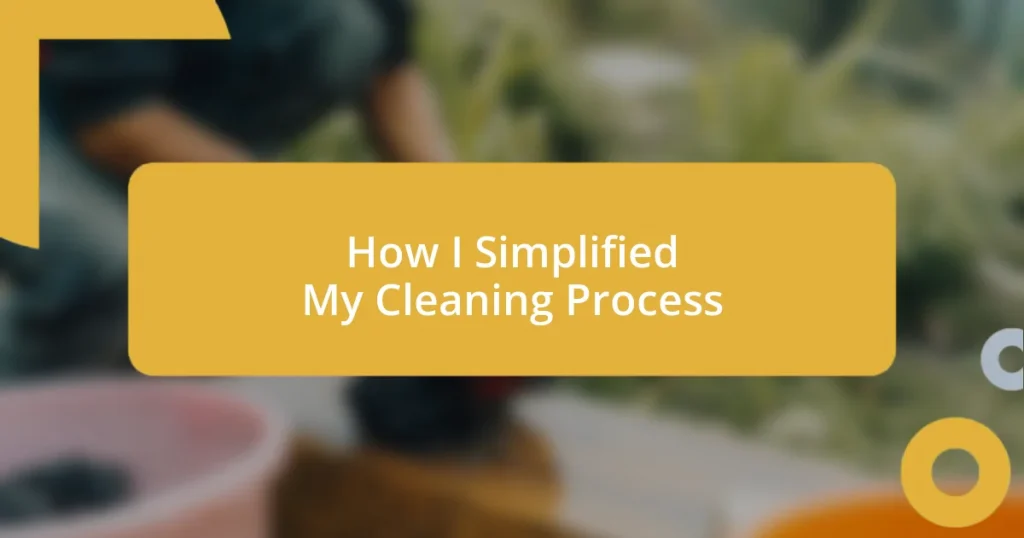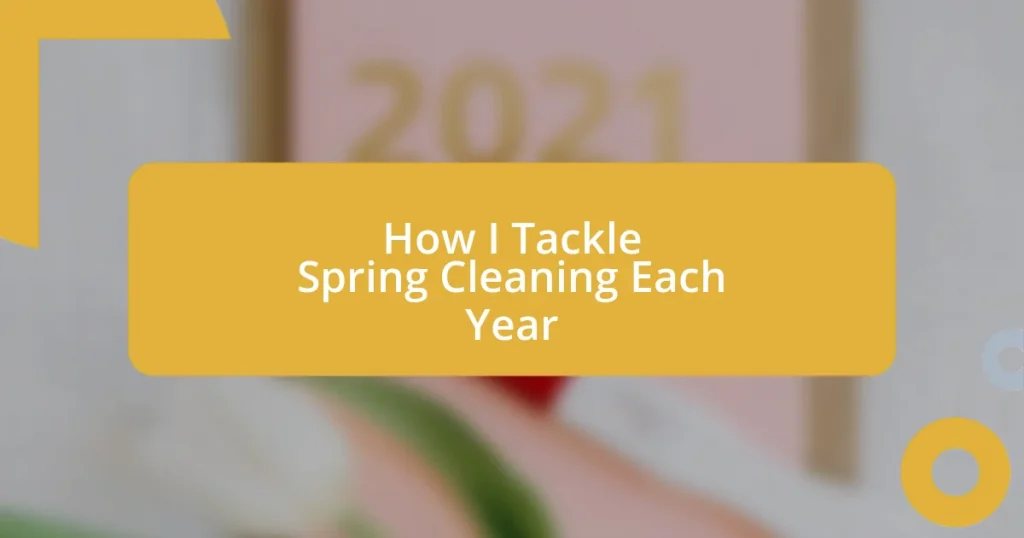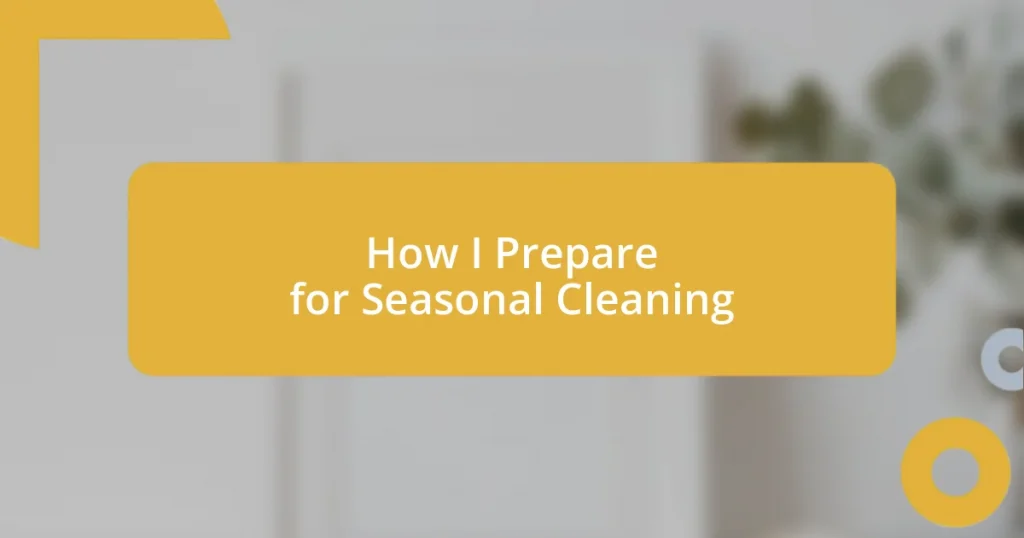Key takeaways:
- Eco-friendly cleaning certifications validate product effectiveness and adherence to environmental and safety standards, empowering consumers to make informed choices.
- Certification programs like Green Seal and Safer Choice promote sustainable practices among manufacturers, encouraging better environmental choices and benefiting individual health.
- Resources such as online directories, local organizations, and social media groups provide valuable information and community support for those seeking eco-friendly cleaning solutions.
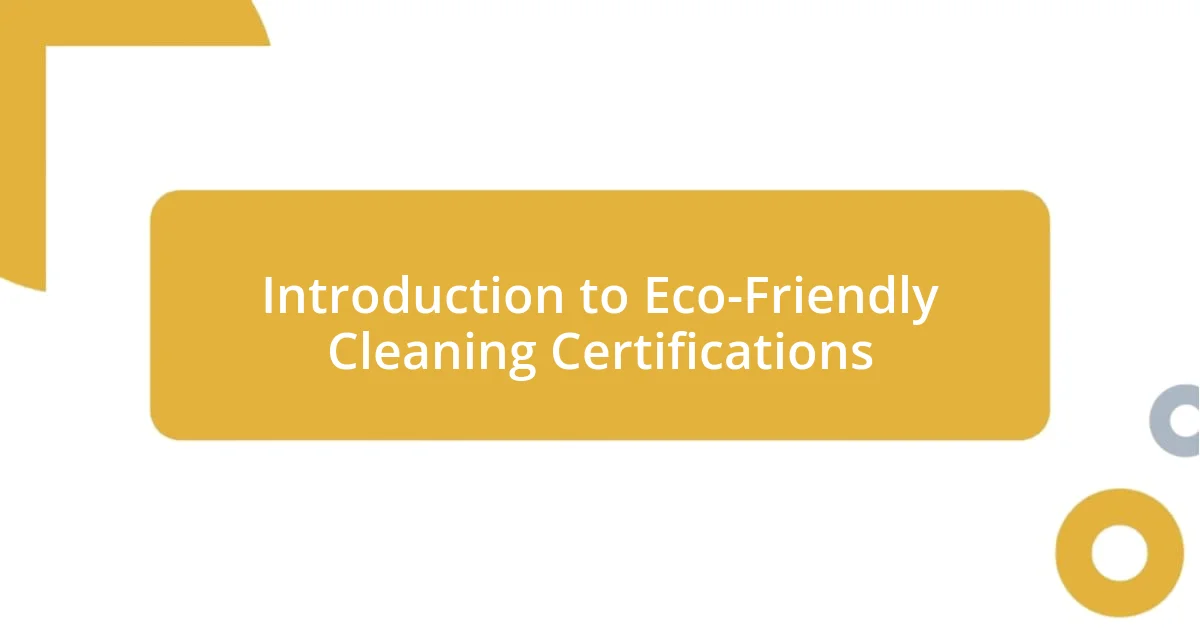
Introduction to Eco-Friendly Cleaning Certifications
Eco-friendly cleaning certifications are becoming increasingly important as more individuals and businesses recognize the impact of their cleaning practices on the environment. I remember when I first learned about these certifications; it felt like an awakening. I wondered, why should I settle for cleaning products that harm both my home and the planet?
These certifications not only validate the effectiveness of green cleaning products but also ensure they meet specific environmental and safety standards. I’ve often found myself contemplating the myriad of labels on cleaning products at the store, feeling overwhelmed. Understanding what these certifications mean can transform the way I make purchasing decisions, giving me confidence that I’m making a positive choice for my family and the Earth.
Learning about eco-friendly certifications has empowered me to share this knowledge with friends. I often ask them, “How can we advocate for a healthier planet if we’re not even paying attention to what we use in our own homes?” It’s a step toward sustainability that feels personal and impactful.
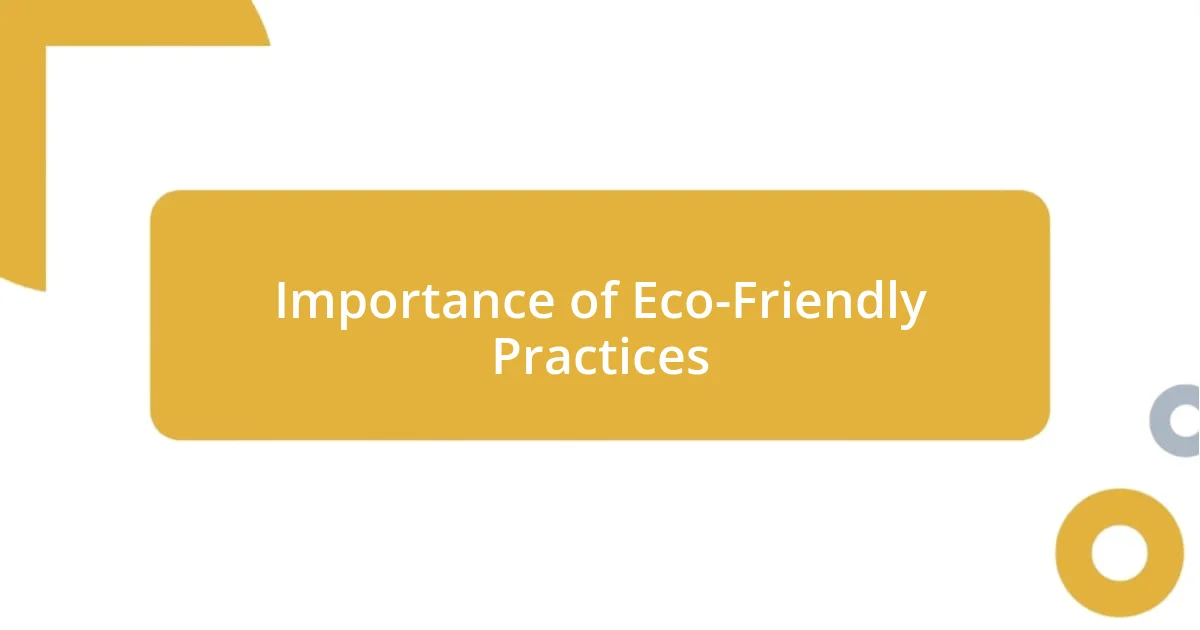
Importance of Eco-Friendly Practices
Understanding eco-friendly practices isn’t just an added bonus; it’s essential for a sustainable future. I still remember the time I realized how common household cleaning products could pollute our water systems. It sparked a sense of responsibility in me. I began to see each purchase as a vote for the kind of world I wanted to live in. By choosing eco-friendly options, we’re actively participating in preserving our planet for future generations.
The importance of these practices goes beyond individual actions. I often think about how collective changes can create a ripple effect in communities. When I shared my journey toward eco-friendly cleaning with my neighbors, I noticed a shift; they were inspired to ask questions and make changes in their own homes. This shared commitment helps us build healthier environments together, reinforcing the idea that we’re not alone in this journey.
Furthermore, adopting eco-friendly practices aligns with personal values, promoting a healthier lifestyle. I vividly recall a conversation with a friend who struggled with allergies due to conventional cleaning products. After switching to certified eco-friendly cleaners, she noticed a significant improvement. Her relief and newfound comfort underscore the broader benefits of these choices—not just for the environment, but for our personal well-being, too.
| Eco-Friendly Practice | Traditional Practice |
|---|---|
| Biodegradable Ingredients | Harsh Chemicals |
| Less Water Pollution | High Water Pollution |
| No Toxic Residues | Toxic Residues |
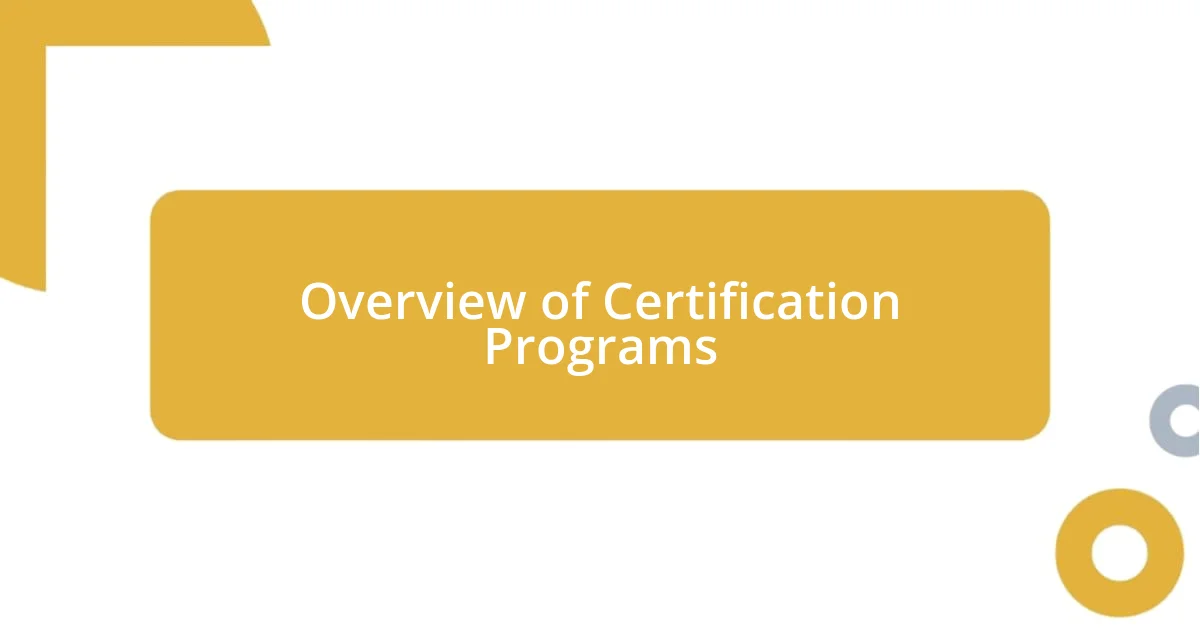
Overview of Certification Programs
Certification programs for eco-friendly cleaning products are designed to ensure that products meet established environmental and health standards. I recall my first encounter with the Green Seal certification, as I stood in the cleaning aisle, grappling with my choices. It was reassuring to discover that brands bearing such certifications had undergone rigorous testing. This not only instilled trust but also made me feel proactive in my purchasing journey.
Here are some notable certification programs worth considering:
- Green Seal: Focuses on sustainability across various product categories through stringent criteria.
- EcoLogo: Recognizes products that have minimal impact on the environment and human health.
- Safer Choice (EPA): Endorses products that meet the EPA’s strict safety and environmental standards.
- USDA BioPreferred: Identifies products made from renewable resources, promoting a shift towards bio-based options.
Each of these certifications has its own criteria, and I find it fascinating how they encourage manufacturers to improve their practices. When I see a product with one of these labels, I feel like I’m part of a larger community advocating for safe, eco-conscious choices. These certifications bridge the gap between consumer awareness and responsible production, making me more discerning in my selections.
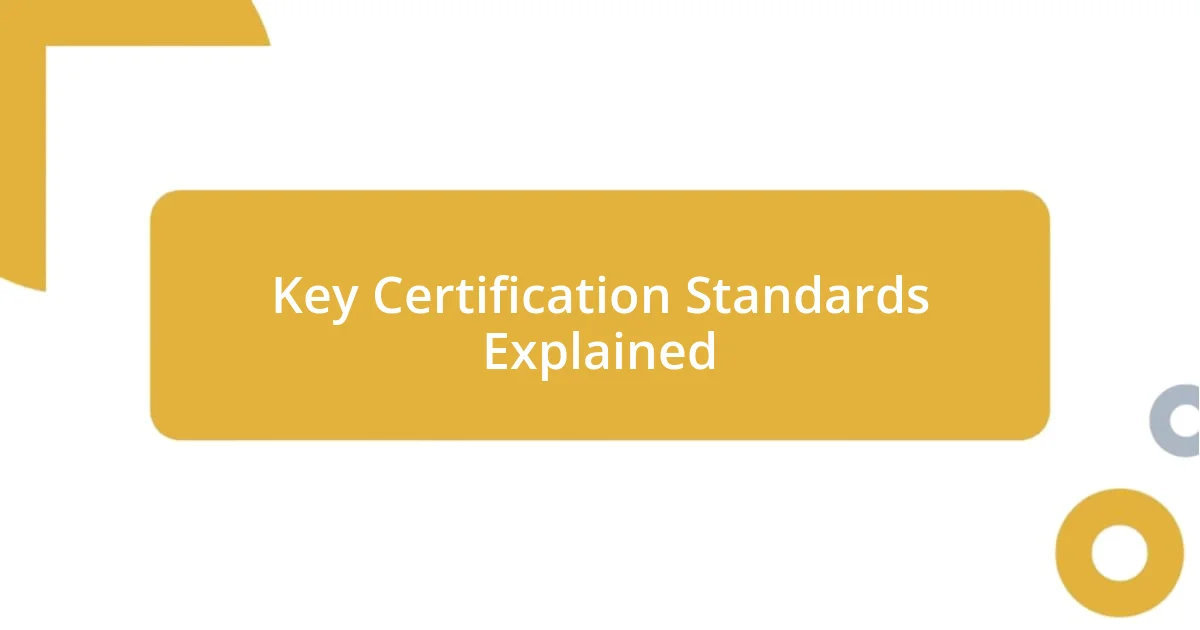
Key Certification Standards Explained
The certified standards behind eco-friendly cleaning products often feel like a safety net for me. Take the Green Seal certification, for example; it was the first one I sought out after realizing how much I wanted to make a conscious impact. I remember standing in my kitchen, holding a bottle of cleaner adorned with that green label, and feeling a refreshing sense of peace, knowing that it was backed by rigorous testing for safety and sustainability. Isn’t it comforting to know there are trustworthy benchmarks in our pursuit of healthier homes?
Another significant certification is EcoLogo, which has opened my eyes to the broader spectrum of environmentally friendly options. I distinctly recall my excitement when I learned that products under this label not only minimize environmental impact but also cater to human health. There’s this compelling satisfaction in choosing cleaners that contribute to a cleaner planet while also ensuring my family’s safety. I often think, why settle for less when we can support products that honor both our well-being and that of the Earth?
The Safer Choice label from the EPA has become my go-to recommendation for friends who are new to eco-friendly products. I can’t tell you how many conversations have sparked around this topic! When I convinced a dear friend to try a cleaner with this certification, she was amazed at how effective it was, contradicting her belief that eco-friendly products couldn’t stack up against traditional ones. Watching her transformation made me realize how impactful these certifications can be—not just as labels, but as tools for education and empowerment, guiding us toward smarter choices.
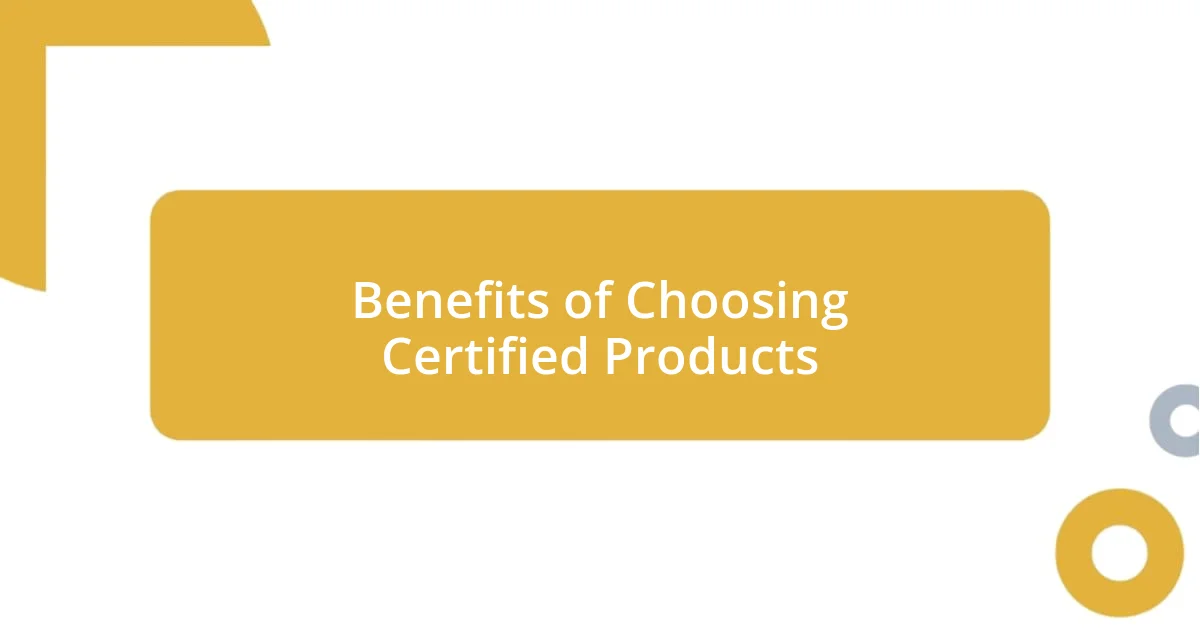
Benefits of Choosing Certified Products
One of the biggest benefits of choosing certified eco-friendly cleaning products is the peace of mind they provide. I remember the first time I cleaned my living room with a product carrying the USDA BioPreferred label. As I wiped down surfaces, I couldn’t help but think about how I was opting for products made from renewable resources. It made my cleaning session feel fulfilling, like I was playing my part in promoting sustainability while also caring for my family and pets.
Choosing certified products also supports a larger movement toward environmental responsibility. I once attended a sustainability workshop where an expert emphasized how our purchasing decisions can drive change in the marketplace. It struck me that every bottle I bought with a certification could encourage manufacturers to prioritize eco-friendly practices. This realization motivated me to become more intentional with my choices—each purchase felt like a vote for better environmental standards that benefit us all.
Moreover, certified products often outperform conventional ones in terms of safety and efficacy. I vividly recall when a friend and I decided to test two similar cleaning sprays: one certified and the other not. The certified cleaner not only tackled tough stains effortlessly, but it also left behind a fresh scent, free from the harsh chemicals I used to associate with cleaning. This experience reshaped my understanding and left me pondering: why would anyone choose otherwise? The benefits of certified products are compelling, and my confidence in them continues to grow with each use.
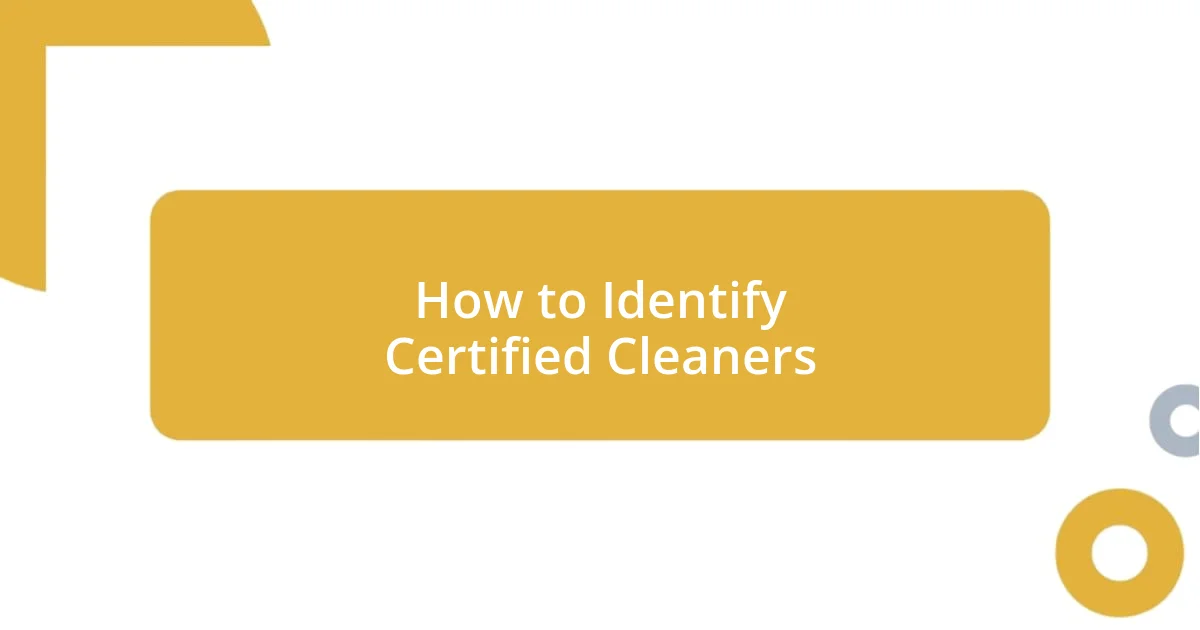
How to Identify Certified Cleaners
When searching for certified cleaners, I’ve found that a quick glance at their labels often reveals a lot. For instance, I remember picking up a product that boasted the Green Seal certification; that small emblem made a big difference in my confidence as I read about its rigorous testing for safe, sustainable ingredients. Have you ever noticed how these seals can instantly transform your perception of a product?
Another practical approach is checking online directories or asking for recommendations from friends who prioritize eco-friendly options. I did this when I was looking for local cleaning services, and I was pleasantly surprised at how many provided certifications. It’s like peeking behind the curtain; knowing someone else has vetted these cleaners gives me peace of mind.
Lastly, contacting the cleaning service directly can be incredibly informative. I once inquired about the certifications of a company I was considering and was amazed when they walked me through their eco-friendly practices in detail. Their transparency was refreshing and reassured me that they genuinely care about their impact on the environment. Why wouldn’t we seek out that level of accountability in the services we hire?
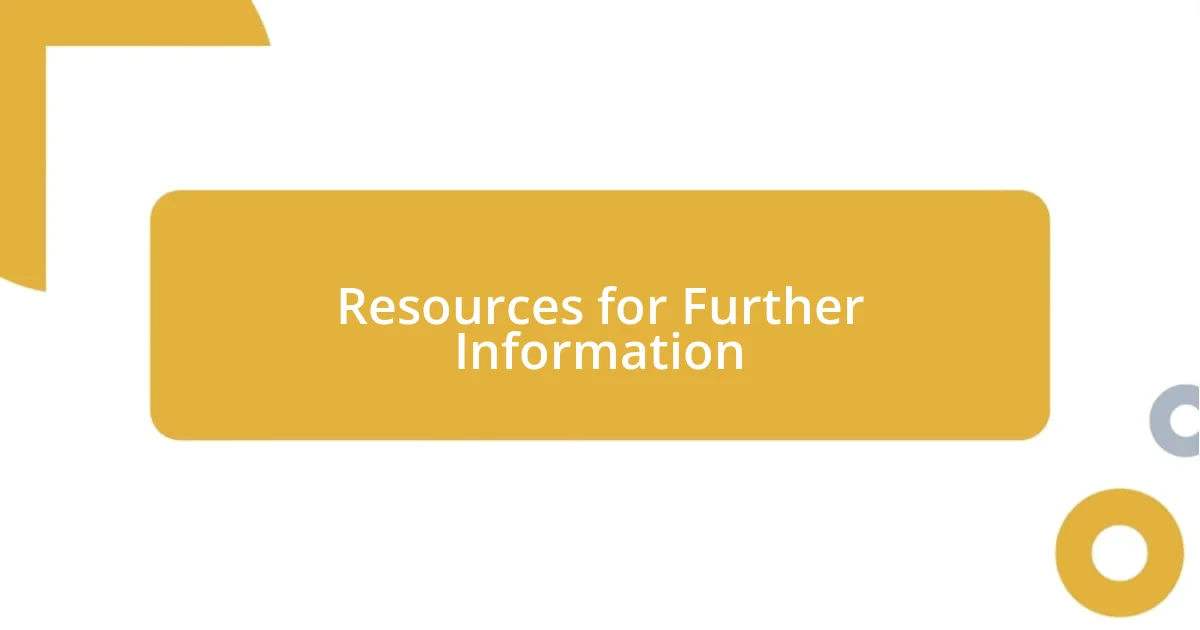
Resources for Further Information
When seeking further information about eco-friendly cleaning certifications, online resources can be a goldmine. I remember diving into various websites like the Environmental Protection Agency (EPA) and the Green Seal, where I found in-depth explanations of different certifications. The wealth of knowledge available can be overwhelming, but it’s empowering to sift through this information, right? It helps me make informed choices that align with my values.
I also recommend exploring local environmental organizations. I stumbled upon a group in my community focused on sustainability, and they offered workshops that educated members on eco-friendly products, including cleaning supplies. Those sessions not only enriched my understanding but also connected me with like-minded individuals. Have you ever experienced that sense of community when sharing knowledge? It really enhances the learning process.
Don’t overlook social media and online forums either. I joined a Facebook group dedicated to sustainable living, where members frequently share tips, product reviews, and personal stories about eco-friendly choices. Engaging in these discussions has opened my eyes to certifications I hadn’t considered before. The collaborative nature of these platforms creates an enriching space for learning and understanding the impact of our purchases on the planet. Isn’t it inspiring to think about how shared experiences can lead to collective change?




